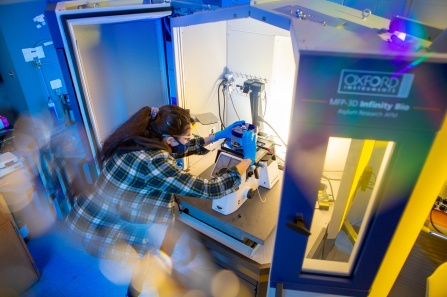Graduate Education

The Materials Design and Innovation department emphasizes a data-driven perspective of materials discovery and design. We offer unique graduate programs that use materials informatics to link the experimental and computational perspectives of materials science and engineering.
On this page:
Disciplinary knowledge with an interdisciplinary perspective.
Our Materials Design and Innovation MS program is designed to educate individuals so that they have disciplinary knowledge and expertise in materials science and data science. Students are trained to have interdisciplinary perspectives and the necessary skills and tools to be able to understand and apply computational tools for modeling, simulation and informatics, together with experimental driven science so that they have the ability to contribute to and work to accelerate the pace of materials discovery and engineering design.
Students have the option to complete two additional courses in a focus area to earn a specialization in one of the following tracks:
- Machine Learning and AI
- Energy, Environment and Sustainability
- Advanced Manufacturing
Specialization tracks can be completed within 16 months.
The Materials Design and Innovation MS degree requires a minimum of 30 credit hours, and a minimum overall GPA of 3.0. The program can be completed within 12-16 months. Required courses are as follows:
Fall Compulsory Courses (3 credits each)
- MDI 501 LEC Introduction to Materials Design and Informatics
- MDI 502 LEC Quant Structure-Property Relationship in Materials
- MDI 503 LEC Thermodynamics and Molecular Structure of Materials
- MDI 504 LEC Multivariate Statistics and Materials Informatics
Spring Compulsory Courses (3 credits each)
- MDI 505 LEC Computational Materials Chemistry and Physics
- MDI 506 LEC Kinetics, Microstructure, and Defects
- MDI 507 LEC Quantitative Methods in Materials Characterization
- MDI 508 LEC Experimental Design for Materials Development
Summer/Fall (6 credits)
- MDI 700 TUT Semester Master’s Project
- Disciplinary knowledge in the areas of materials science and data science.
- Awareness and ability to query and work with databases in materials science.
- Operational skills in statistics and data mining methods as applied to materials science.
- Ability to use computational methods in the analysis of experimental and/or simulation data.
- Develop relevant scientific literacy and have the ability to communicate in written and verbal formats.

Combined BS Chemistry/MS Materials Design and Innovation
The nine-semester combined program provides qualified students pursuing a BS in Chemistry to seamlessly transition into the MS degree in Materials Design and Innovation more quickly and less expensively than through normal means. Students are admitted to the combined degree program between their fourth and sixth semesters, and must have a 3.0 average for all undergraduate courses up to the time of admission.
A core foundation + cutting-edge courses and research.
Our Materials Design and Innovation PhD provides traditional and classical core foundations of materials science subjects, but taught from the perspective of statistics, interpretation of databases and data mining methods.
Beyond these core foundations, new distinctive courses in materials science that cover materials informatics, advanced computing methods and machine learning, robotics for materials engineering and an integrated “atoms to device” experimental development laboratory are offered. The PhD program provides training in all facets of computational data science that would be of value to both experimental and computational materials scientists.
The PhD degree in Materials Design and Innovation requires the following:
- Successful completion of the core course requirements, a minimum overall GPA of 3.0, and a project as per the MS degree
- Passing of a PhD comprehensive exam based on the core graduate courses in MDI
- Completion of nine (9) additional credits based three advanced level courses in MDI or related discipline
- Completion of PhD thesis
- In-depth knowledge in the areas of materials and data sciences, as well as well as the knowledge needed to integrate these fields.
- Critical thinking skills to define a research question and an appropriate strategy for developing a viable research proposal.
- Learn how to identify a materials science problem, either computational or experimental, and how an interdisciplinary approach that includes data analytics can find a solution to that problem.
- Develop familiarity with the interrelationship between experimental and computational perspectives of any given research problem in materials science.
- Ability to learn to clearly write and verbally present advanced scientific concepts.
- Understanding of the broad skills needed to advance their careers and some proficiencies in those skill-sets.

Transfer from MS to PhD Program
Coursework in our Materials Design and Innovation MS program is automatically credited toward our PhD program. To transfer to our PhD program, students must complete a comprehensive exam. The average completion time from entry in our MS program to PhD is four-to-five years. Following the MS program, completion of our PhD program requires:
- Three (3) advanced graduate elective courses
- Thesis
Applicants must complete an online application, upload unofficial transcripts, and provide a personal statement and resume. GRE scores are not required but recommended, particularly for applicants without strong academic training in mathematics, statistics, or physics. Letters of recommendation are required for all MDI graduate programs. International students are also required to submit proof of English language proficiency.
Application Materials
Students can apply online. New applicants must create an account. If you have applied in the past, you will be asked to log in to your existing account to start a new application.
The application includes sections that will ask you to provide us with personal/biographical information, contact information, citizenship details, your past or current college/university, and degree details. You will be able to enter the names and contact information of your recommenders and upload supporting materials to your application. You may upload supporting documents while completing the application form or after you have submitted your application in your Application Status Portal.
You do not need official transcripts or test scores to apply. Unofficial copies are sufficient for application review, but students are encouraged to provide official copies if they have them.
A non-refundable fee of $100 is required to apply for Spring 2025 or later terms. The application fee for Fall 2024 is $85. After you submit your application form, you can pay the application fee online in your Application Status Portal with a credit card or e-check.
Please upload a brief personal statement describing your educational objectives, your academic experience, and why you're interested in the program. There is no required length or word limit for the statement.
Copies of transcript(s) for all post-secondary schoolwork must be uploaded with your application for initial review. Upon an offer of admission, accepted applicants will be required to submit official transcripts and proof of degree(s).
- Two (2) letters of recommendation are required to apply to the master's program.
- Three (3) letters of recommendation are required to apply to the doctoral program.
Letters are automatically requested when you enter recommenders' names and email addresses in your application. While we will accept letters from professional sources, we strongly prefer letters from professors acquainted with your academic interests, achievements, and abilities.
Upload a resume or curriculum vitae (CV) to your application. Your resume or CV should include details about your education, employment, and internship history. Pertinent research experience should be included as well.
GRE scores are optional but recommended for this program. If you would like to take the GRE, you can arrange to take it through the Educational Testing Service (ETS). Official scores should come directly from ETS.
Note: the University at Buffalo Institutional Code is 2925.
International applicants are required to provide proof of English proficiency. The chart below outlines acceptable test types and the university's minimum score required for admission. All applicants whose native language is not English will be required to provide proof of English proficiency.
Copies may be submitted for initial review. Official scores must be sent directly to UB from the testing agency.
| Test Type | University Minimum Score | To Order... |
|---|---|---|
| TOEFL (IBT) (including MyBest scores) TOEFL Home Edition | 79 | Use Institution Code 2925 |
| TOEFL Essentials | 8.5 | Use Institution Code 2925 |
| TOEFL ITP Plus | 550 | Use Institution Code 2925 |
| IELTS and IELTS Indicator | 6.5 | Select "University at Buffalo, State University of New York (SUNY)" |
| 55 | Select "University at Buffalo, State University of New York (SUNY)" | |
| Cambridge English Proficiency (CPE) | 185 | Select "University at Buffalo, State University of New York (SUNY)" |
| Cambridge English Advanced (CAE) | 185 | Select "University at Buffalo, State University of New York (SUNY)" |
| Duolingo English Test (DET) | 120 | ADA Department of Testing will report your official scores to central application services |
Exam results must be dated within two years from your proposed date of admission and remain valid upon entering the term for which you applied.
It is strongly recommended to make test arrangements early in the year so sufficient time can be allowed for the results to be reported before application deadlines.
Exemptions to English Language Proficiency requirements can be found on The Graduate School website.
Applications are strongly encouraged to be submitted by February 15th to receive full consideration for Fall entry.